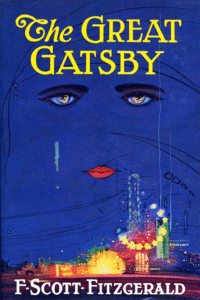 |
| Boulevard of broken dreams. |
Except for Leonardo DiCaprio (who's looking a little pudgy around the jowls), the cast was too tightly controlled by the iron-clamp production to be able to create human beings with believable idiosyncrasies—the kind of imperfections that allow a performance to breathe. The actors are largely props in marvelously explosive tableaus (New York looks like a Jules Verne creation, and the Art Deco mansions are steely, cartoonish Studio 54s). DiCaprio is able to do more than adopt Jazz Age poses. He navigates the mega-technology and whiz-bang camera successfully, and he steals a great many scenes (except perhaps those with his gorgeous Duesenberg, whose shimmering yellow coat of paint mirrors Gatsby's tailored suit). Gatsby's self-made man (in post-Horatio-Alger America—serendipitously mentored, financed, and launched) pulls you in deeply enough that you're fixated on the boulevard-of-broken-dreams corrupted hope theme, which could be the green light of our collective movie past.
No comments:
Post a Comment